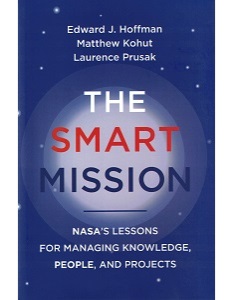First of all, for those well-versed in ESA missions, this is not a book about the Small Missions for Advanced Research in Technology (SMART). It is, in fact, a treatise on the right way to run a project, as trailed by the book’s subtitle: “NASA's Lessons for Managing Knowledge, People and Projects”.
In 150 pages, three project management experts explain “why human skills and expertise, not technical tools, are what make projects succeed”. They do so by expounding on three main themes: the fundamentals of teamworking; the relative importance of the “local level” as opposed to upper management; and the fact that projects are done “within organizations that are responsible to stakeholders”. Drawing on examples and case studies from NASA and other organisations, the authors identify three project models - micro, macro and global – and supposedly challenge “the conventional wisdom on project management, focusing on the human dimension: learning, collaboration, teaming, communication, and culture”.
Whether or not one can believe the obvious marketing hyperbole that this is a “paradigm-shifting book” must rest with the individual reader, but the fact that this book has been published at all suggests a need for such ‘common sense’ advice. Surely, it is apparent to anyone who has worked on a project of any size that things go better when those involved work as a team; that those ‘at the coal face’ understand the key issues better than those in their ivory towers; and that no project, however important, can operate in a vacuum, immune from financial and political influences. I guess the old adage is a truism: common sense is just not that common!
This sounds like a reviewer questioning the need for such a book, but I like to think that the authors would support the views expressed above. In discussing the concept of ‘knowledge’, the text describes the lead author’s reluctance at being appointed NASA’s chief knowledge officer, because “the last thing he wanted was to be the antagonist in a turf war”; he accepted only when convinced that he had the backing of NASA’s senior leaders. The nice thing about this book is that it eschews the usual management bilge-speak and calls a spade a spade, especially if it’s a rusty spade with a broken handle. In support of its main premise that it's the people that matter, it concentrates on the human dimension and speaks to the reader on a personal level. Its chapters on knowledge, learning, stories, culture and teaming are pragmatic and peppered with compelling examples.
One can only hope that it is indeed a “paradigm-shifting book”, but if you expect the ethos and operation of entrenched management systems to change overnight you might be disappointed.











